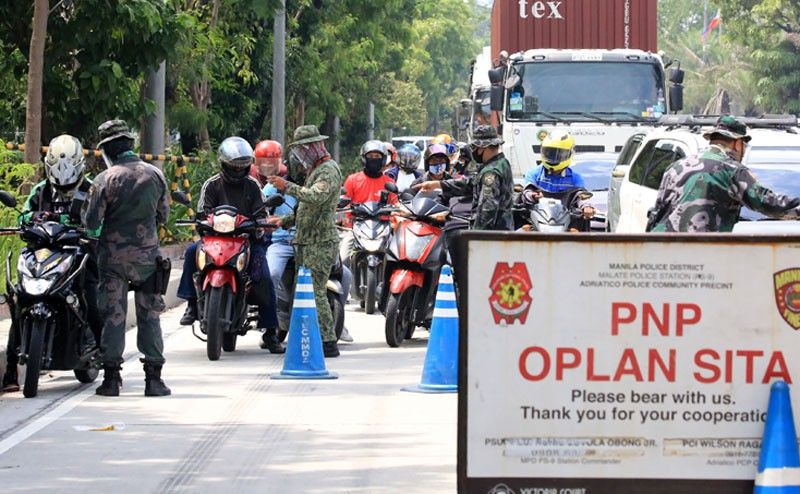Quarantine eased; Metro Manila back to GCQ

DAVAO CITY, Philippines — After a two-week return to the stricter modified general community quarantine, President Duterte announced last night that Metro Manila and the provinces of Bulacan, Cavite, Laguna and Rizal would be eased back to the more lenient GCQ starting tomorrow until the end of the month.
Other areas that will be under GCQ are the provinces of Batangas, Nueva Ecija and Quezon; the cities of Iloilo, Cebu, Lapu-Lapu, Mandaue and Talisay; and the municipalities of Minglanilla and Consolacion in Cebu.
The rest of the country will be under the most lenient modified GCQ or MGCQ.
Duterte made the announcement from the Enclave Residences Guesthouse here after a teleconference with the Inter-Agency Task Force for the Management of Emerging Infectious Diseases (IATF).
Dine-in services will be allowed again in restaurants, while up to 30 percent capacity for religious gatherings will be allowed as more businesses resume operations, presidential spokesman Harry Roque said.
He promised a “reboot” or “refreshed” response to COVID through more testing and house-to-house tracing of mild and asymptomatic cases, among others, as “testing, tracing and treatment” are ramped up.
“The economy will be opened but the response should be refreshed,” Roque said.
The announcement was made even as Roque said mayors were in favor of placing Metro Manila under GCQ, but not as lenient as the one in place before the imposition of MECQ from Aug. 4 to 18.
Metropolitan Manila Development Authority (MMDA) general manager Jojo Garcia said at a virtual press briefing yesterday that Metro mayors again opted to leave the matter to the discretion of the President.
“Our mayors have agreed that we will trust the wisdom of the IATF, and we will follow,” Garcia said.
Responding to pleas for a “timeout” from doctors and health workers, the President reverted the National Capital Region and the provinces of Bulacan, Laguna, Cavite and Rizal early this month to MECQ from GCQ.
The NCR and the four nearby provinces contribute about two thirds of the country’s economic output. Before the imposition of MECQ, the government allowed some non-essential businesses to resume operations in GCQ areas as it sought to revive the pandemic-hit economy while safeguarding public health.
“I can confirm that the recommendation of mayors is GCQ but the GCQ that was implemented in June, which is stricter than the eventual GCQ being implemented now. The IATF listened to them intently and it will be incorporated in their recommendation to the President,” Roque said.
“Let’s just say, the recommendation of the IATF and Metro Manila mayors to the President was unanimous,” he added.
Roque noted that Metro Manila constitutes one geographic unit and should remain under a single classification.
“The classification was thoroughly discussed by the IATF and it was based on what we call the case doubling rate, the clusters of COVID cases in different areas and the critical care capacity,” Roque said.
“Now, so far, our case doubling rate has not worsened and as of today, August 17, we inaugurated a 250-bed capacity at the East Avenue Medical Center that will cater exclusively to COVID patients. Our critical care capacity improved and is no longer in the danger level,” he added.
Garcia, meanwhile, said the mayors in a late meeting Sunday decided to discuss and prepare for both scenarios under MECQ or GCQ.
If ever GCQ were enforced, the mayors would want a more stringent form than what was imposed last June that limited the number of people at mass gatherings and commercial establishments.
But this time, they said there should be more options for public transportation to allow mobility of people going to work.
The mayors would want a “stricter GCQ” that would allow them to impose targeted lockdowns in areas with high infection rates, as well as an earlier curfew of 8 p.m.
He noted that easing public transportation had been done under this month’s MECQ, when tricycles and pillion riding on motorcycles were allowed as long as health protocols were observed.
Only railway and point-to-point buses and shuttle vans were allowed when GCQ was first imposed last June 1.
Restrictions on public transportation were eased later on with the resumption of some jeepney and bus routes on reduced passenger capacity.
Non-essential services like barbershops and salons, and dine-in restaurants were also allowed to gradually open when GCQ was first enforced.
“We need public transportation all the more because if transportation is limited, it would be more difficult for the commuters to comply with physical distancing,” Garcia said.
“Our Metro Manila mayors can no longer afford for us to go back to ECQ. One way of helping the people go to work is to give them a choice to avail of public transportation,” he added.
Transport groups have called on the government to resume public transportation with minimum public health standards to reduce virus transmission worsened by crowding of stranded commuters.
Nuances of local gov’t
Asked if the Metro Manila Council (MMC), the MMDA’s policymaking and recommendatory body composed of the 17 Metro Manila mayors, would still be relevant if IATF would always have final say, MMDA’s Garcia said yes because IATF needs to know the “nuances” at the local government level.
“Even the secretaries are telling us that we should give it to the local government units, because it is them implementing on the ground. The higher-ups still need to know the situation on the ground. Most of the MMC’s recommendations are being heard by the IATF. There are no disagreements,” Garcia said.
The MMDA declined to disclose details of the votes among the mayors.
Navotas Mayor Toby Tiangco said he voted to extend the MECQ in Metro Manila, but revealed a “majority” of the mayors wanted to revert to GCQ.
He said he would want to further lower the city’s positivity rate of 15 percent recorded during the first week of MECQ this month, an improvement from a 37 percent positivity rate when Metro Manila was under GCQ.
The Department of Trade and Industry (DTI), for its part, said it prefers GCQ for Metro Manila to allow more people to go back to work.
“At this point, I must tell you that we continue to put forward our position to move to GCQ so that again, those who want to work and healthy to work would be able to work,” Trade Secretary Ramon Lopez said at a virtual signing of an agreement between the DTI and PLDT Inc. for the One Town, One Project Next Generation to help micro, small and medium enterprises.
“We just hope to continue to live, to operate, to do business the safest way possible so our gradual opening, it must continue but (should be done) safely,” he said.
As part of the push for safe reopening of businesses, the DTI and the Department of Labor and Employment (DOLE) have issued additional health protocols in the workplace.
Lopez clarified that under the guidelines contained in Joint Memorandum Circular 20-04-A of the DTI and DOLE, testing is not required for businesses.
“We just recommended it, we encouraged testing at least once every quarter. It is not required,” he said.
He said testing, however, would be required for employees with symptoms of the virus.
When it comes to the test to be used, he said the government is recommending polymerase chain reaction and not rapid testing.
“Don’t listen to other sectors pushing for rapid testing. That is not needed. What is needed is PCR for the symptomatic,” he said. — Louella Desiderio
Related video:
- Latest
- Trending





























